Project reports
Official ECO-Ready project reports including project deliverables that are marked as “public”
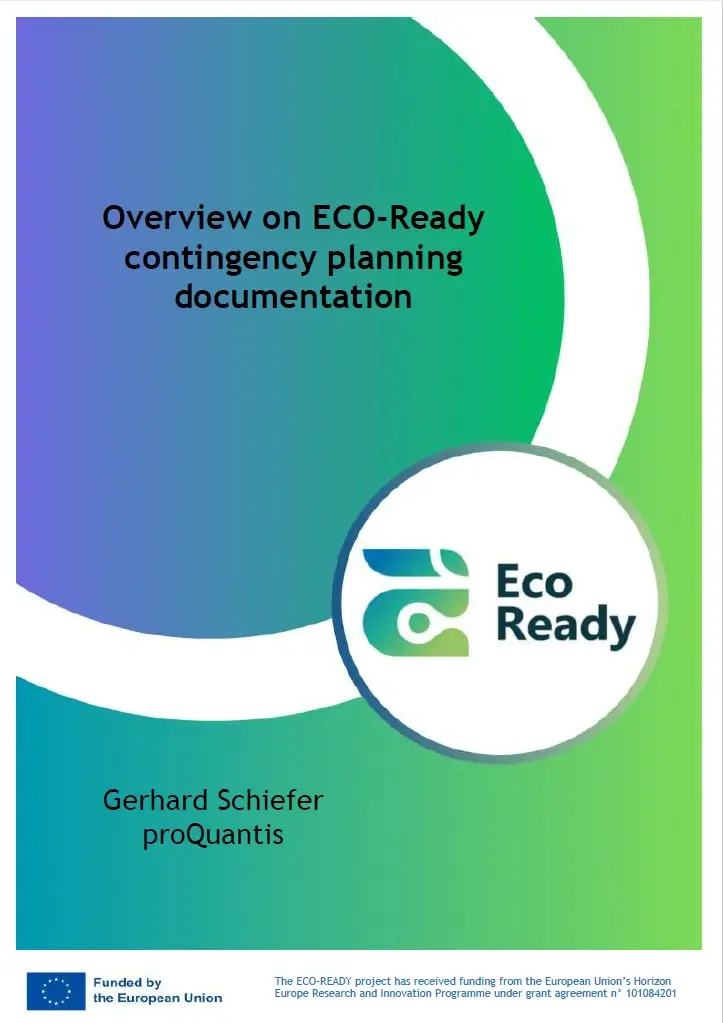
Overview on ECO-Ready contingency planning documentation
Report by Gerhard Schiefer proQuantis GmbH & Co. KG
Contingency planning deals with short term, suddenly emerging situations which require
immediate ‘contingency actions’ for ‘repair’. It is complementary to a long-term approach,
enabling to anticipate and mitigate shocks intensity, improving overall the resilience of the
food system.
This report summarizes the activities within the ECO-Ready project in supporting
European Living Labs in developing contingency plans for selected hazards their region
might have to cope with. All activities are documented in specific ECO-Ready reports
which are accessible on the ECO-Ready website www.eco-ready.eu.
The contingency planning documentation includes 7 reports:
1. Contingency planning: A framework for dealing with contingencies in food security
(ECO-Ready deliverable 5.2)
2. Potential LLM planning support for Living Labs: an example for demonstration
(Sweden)
3. Contingency planning arguments: the case of Catalonia
4. Contingency planning arguments: the case of Basilicata, Italy
5. Contingency planning arguments: the case of Masuria
6. Contingency planning arguments: the case of the Czech Republic
7. Contingency planning arguments: the case of Central Greece
The conceptual outline is presented in the first report. The second report guides readers
in utilizing Large Language Models for developing a first draft of a contingency plan which
is then up for evaluation, change and improvement by the relevant stakeholder groups.
The report uses an example from Sweden for its demonstration. Reports 3 to 7 are
dedicated case studies building in interaction with Large Language Models. The
interaction policies of the case studies follow a standardized interaction process adapted
to the specific needs of the various cases. The standardized interaction process is
provided in an appendix to this report.
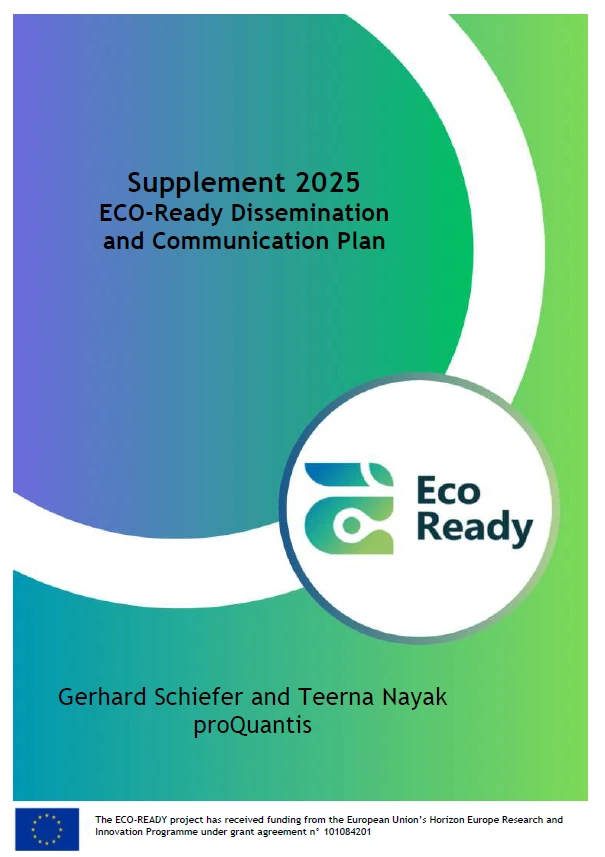
Supplement 2025 ECO-Ready Dissemination and Communication Plan
Report by Gerhard Schiefer and Teerna Nayak proQuantis GmbH & Co. KG
The dissemination and communication efforts of the ECO-Ready project have been outlined
in the
‘Dissemination, Exploitation, and Communication Plan at EU and National Levels’
published as deliverable 6.1 in April 2023. This plan is still valid apart from the tables about
envisaged conference participations which need to be adjusted to new developments.
The initial plan envisaged an annual update for capturing actual developments and
providing a view on what has been reached. The first of annual update report was published
in April 2024 as a supplement to the initial plan. This second report represents the second
supplement to the initial plan and summarizes the dissemination and communication
activities documented by March 2025.
This report concentrates on an analysis of partners’ engagements in meeting the 31 KPIs of
the project, provides an outlook in possible future engagements, contributes to an
evaluation of the intensive social media activities initiated for meeting their challenging
communication targets and provides a first overview on the newsletter developments that
were initiated during the past year. This is complemented by a short view on web
developments and the projects engagement in scientific publications and presentations in
international events.
With the detailed publication of partner engagements to meeting the project’s KPIs and
serving the project’ social media channels, the report contributes to transparency in the
project and makes partners aware of the present situation and needs for future
engagements.
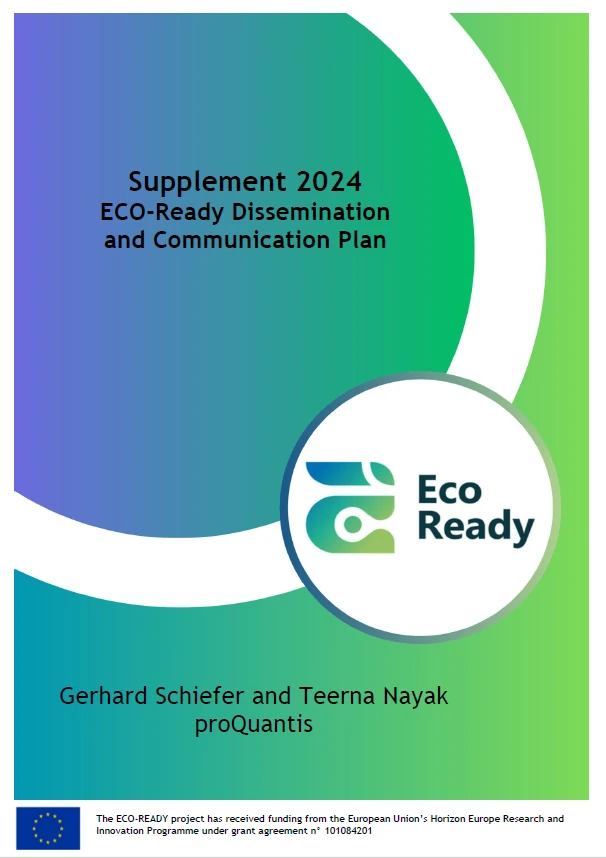
Supplement 2024 ECO-Ready Dissemination and Communication Plan
Report by Gerhard Schiefer and Teerna Nayak proQuantis GmbH & Co. KG
The dissemination and communication efforts of the ECO-Ready project have been outlined
in the
‘Dissemination, Exploitation, and Communication Plan at EU and National Levels’
published as deliverable 6.1 in April 2023. This plan is still valid apart from the tables about
envisaged conference participations which need to be adjusted to new developments.
The initial plan envisaged an annual update for capturing actual developments and
providing a view on what has been reached. This report fulfills this need and is considered
a supplement to the initial plan. It concentrates primarily on an analysis of partners’
engagements in the past period in meeting the 31 KPIs of the project, provides an outlook
in possible future engagements, and contributes to an evaluation of the intensive social
media activities initiated for meeting their challenging communication targets. This is
complemented by a short view on web developments and envisaged future conference
participations and workshop organizations.
There are two groups of KPIs, KPIs which are related to project activities and KPIs which
focus on project results including Living Lab initiatives. At this time of the project, partners
document primarily dissemination engagements in the first group. Contributions to the
second group will be made in due time.
With the detailed publication of partner engagements to meeting the project’s KPIs and
serving the project’ social media channels, the report contributes to transparency in the
project and makes partners aware of the present situation and needs for future
engagements.

Contingency planning: A framework for dealing with contingencies in food security
Report by Gerhard Schiefer and Oscar Sanchez proQuantis GmbH & Co. KG
This report has been prepared within the European project ECO-Ready and is published as deliverable 5.2 of the project. It deals with the challenge of providing a framework for contingency planning related to food security and biodiversity which (a) can support the cooperating Living Labs of the project in developing their own contingency plans and (b) will be used in digital format in service offers provided within the observatory created through the project.
Contingency planning deals with short term, suddenly emerging situations which require immediate ‘contingency actions’ for ‘repair’. It is complementary to a long-term approach, enabling to anticipate and mitigate shocks intensity, improving overall the resilience of the food system. A typical complementary long-term approach would reflect on preservation and investment towards biodiversity within our production models. In following up on this view, the report places primary focus on contingency planning for assuring responses to short term threats.
For meeting the challenge, the report is divided into 2 parts. The first part (Part A) provides the basis for the framework through an analysis of documentations dealing with contingency planning in the context of the project prepared within the European Community, other international organizations and selected scientific literature. As has been mentioned by Rudloff et al. (2012), contingency planning is a “puzzle of existing approaches” which makes it difficult to reach a coherent view. However, when analyzing the different views it becomes apparent that the principal understandings are quite similar and differences are primarily due to differences in focus, priorities, and detail of planning concepts. It concludes with a summary of experiences from international planning processes related to food security which are pre-conditions for a successful engagement in a planning process outlined in part B of the report.
The discussion in Part B transforms the conceptual framework into a managerial concept and develops (1) a scheme for a hands-on planning process and (2) a guide for developing contingency plans by groups with contingency planning responsibility and in case of the project, the Living Labs cooperating with the project. This part outlines a stepwise planning process with 4 functional process lines and discusses issues for consideration in moving through the functional process lines. The overview discussed in part A provides the basis on which the stepwise planning process is organized. A process issue asking for coordination of activities can link up with coordination discussions in policy documents analyzed in part A.
In providing guidance on principal sources of information for use in the stepwise planning process, traditional sources like databases, stakeholder involvement, and expert knowledge can be complemented, with appropriate care and for a very first impression only, with feedbacks from recent developments of Large Language Models (LLM) from Artificial Intelligence. Their use still requires appropriate expertise in search as well as in evaluation of feedbacks, but we need to acknowledge that they are here to stay. The report includes some examples for raising awareness of the support potential of LLMs but also of the reservations and limitations in their use.
This report is linked to an internal supplement for Living Labs where an initial contingency plan for a selected scenario is developed demonstrating the potential of interacting with LLMs making people aware of the potential but also of the paramount need for critical reflection and evaluation.
ECO-Ready A framework for dealing with contingencies in food security
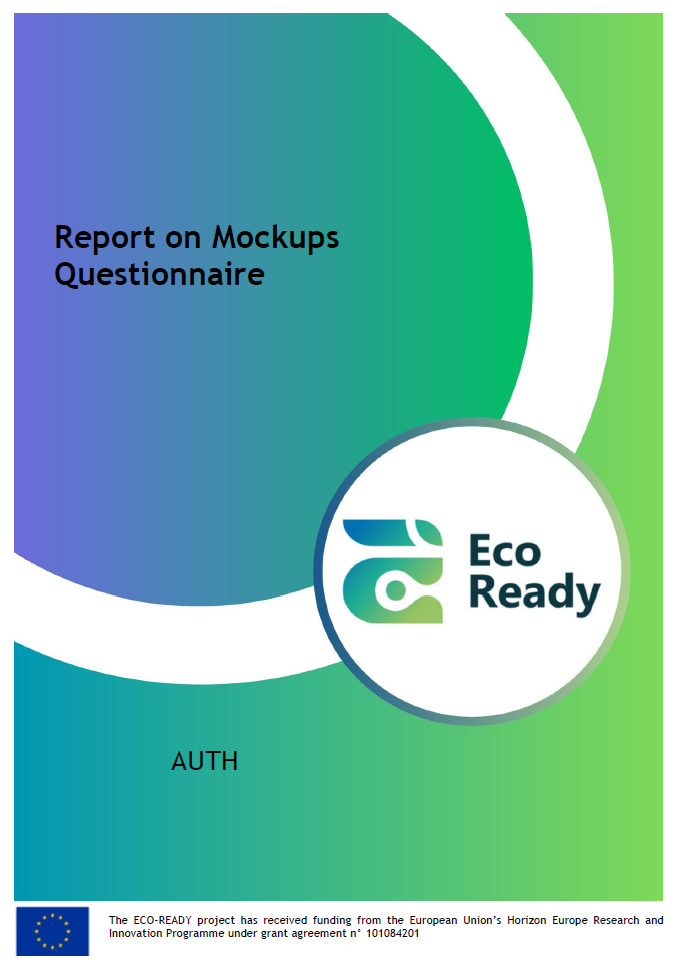
Report on Mockups Questionnaire
Report by Themistoklis Diamantopoulos, Dimitrios-Nikitas Nastos, Andreas Symeonidis
This report summarizes the responses of the participants in the ECO-READY mockup review questionnaire. The aim of the questionnaire was to gather feedback about the mockups of the ECO-READY tools, specifically the dashboard, the interactive map, and the mobile app. Moreover, it was used to ensure that the partners of the project were aligned on the main requirements of the ECO-READY Observatory, including the features as well as the overall look and feel of the tools. The questionnaire is available at this link and full response data are available in this document.
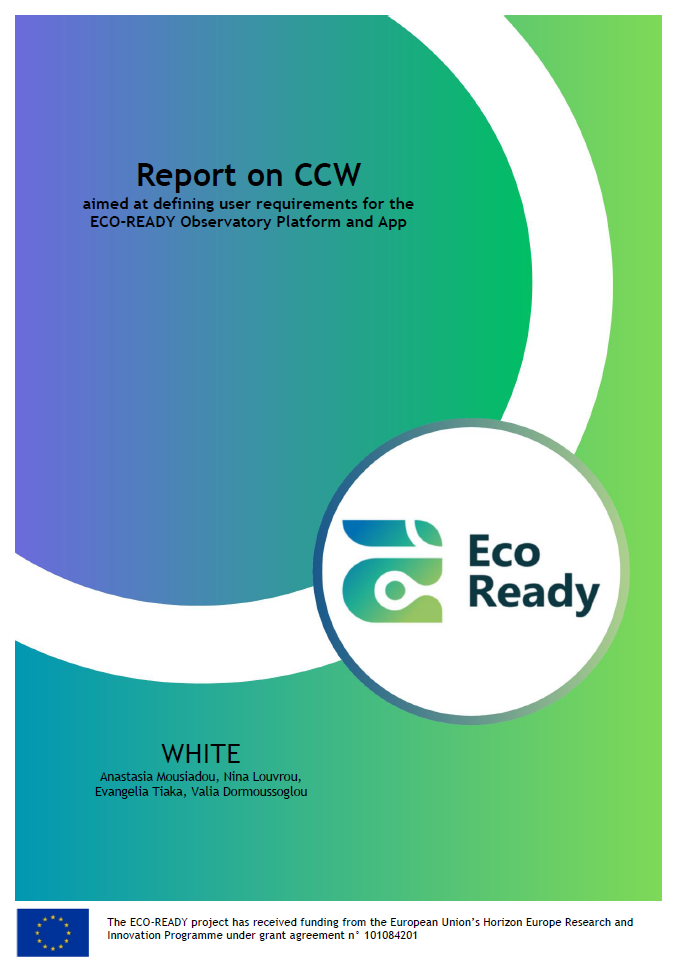
Report on CCW aimed at defining user requirements for the ECO-READY Observatory Platform and App
Report by Anastasia Mousiadou, Nina Louvrou, Evangelia Tiaka, Valia Dormoussoglou
The ECOREADY User Requirements Co-Creation Workshop, held on March 13, 2024, brought together a diverse typeof stakeholders to collaborate on shaping the future of the ECO-READY Observatory platform and app. The workshop, conducted online via the Zoom platform, provided an interactive environment for engagement and dialogue, allowing participants to share their expertise, perspectives, and aspirations for the Observatory's development. Throughout the thematic sessions, participants explored key aspects including user needs and cases, data visualization, features and functionalities, and community interaction. Each thematic session held rich discussions, generating valuable insights and recommendations to inform the project's approach. The workshop's inclusive approach ensured representation from various stakeholder groups, including farmers, industry actors, policymakers, researchers, civil society organizations, representatives of EU food projects, and academics. Their contributions were instrumental in identifying critical requirements, preferences, and priorities for the Observatory platform and app. Moreover, the involvement of Living Labs representatives underscored the importance of integrating end-user perspectives into the design and implementation process. Participants engaged with thought-provoking questions and topics, providing feedback on the visual appearance of the Observatory, desired metrics and data formats, preferred features and modules, and notification preferences. The workshop also facilitated knowledge sharing, allowing participants to suggest existing tools and platforms they deemed relevant for integration with the Observatory. Overall, the workshop served as a crucial milestone in the co-creation process, enabling collaborative decision-making and consensus-building among stakeholders. The insights gathered will play a key role in guiding the development and refinement of the ECO-READY Observatory platform and app, ensuring its alignment with user needs, preferences, and expectations. Moving forward, the project team remains committed to fostering ongoing dialogue and collaboration with stakeholders to realize the vision of an innovative and impactful observatory platform for food security, climate change, and biodiversity.
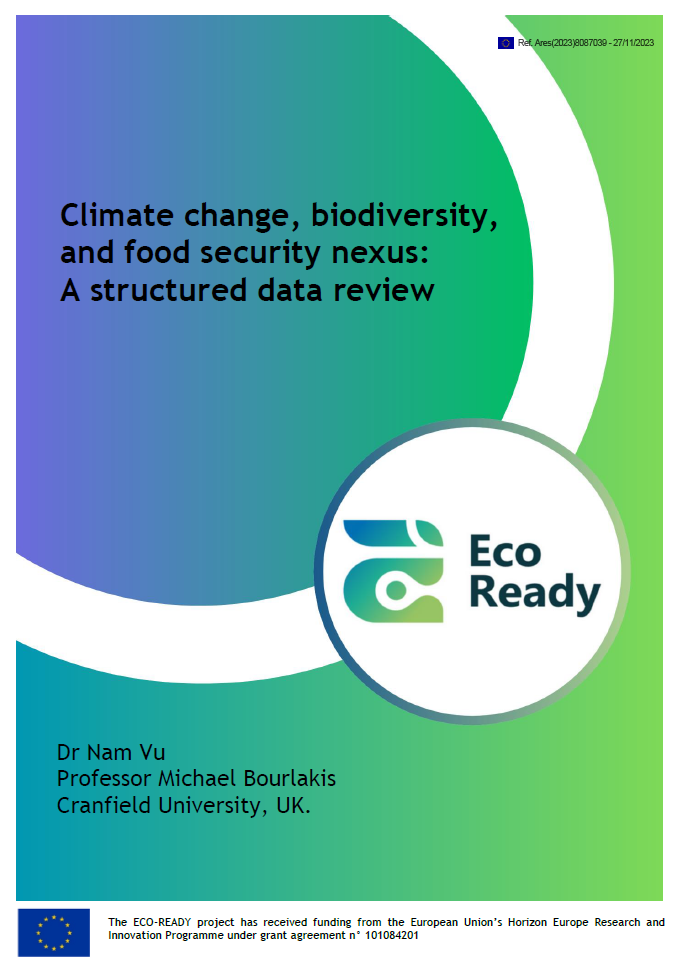
Climate change, biodiversity, and food security nexus: A structured data review
Report by Dr Nam Vu Professor Michael Bourlakis Cranfield University, UK.
The Structured Data Review (SDR) is the main deliverable of Task 1.1 in Work Package 1 of the ECO-READY project. The aim of this review is two-fold. First, this review identifies climate change and biodiversity-induced drivers of food security. To this end, it is highlighted how climate change and biodiversity can affect various dimensions of food security. Second, this review compiles data (e.g. data sets, data sources, data platforms) that are used to monitor/ report climate change and biodiversity drivers of food security. To achieve this aim, two methods were employed. A systematic literature review was undertaken to identify studies that address the nexus of climate change – biodiversity – food security, then to synthesize the key insights from the literature and derive the drivers of food security. Subsequently, a search for data related to the identified drivers was conducted, compiling a list of data for monitoring, measuring, and reporting the drivers. The findings of this report include a list of 20 climate change and 18 biodiversity drivers of food security, an in-depth analysis of how the drivers impact the four pillars of food security (availability, accessibility, utilization, and stability), and data in relation to the drivers from the academic literature, projects (EU level and national level), EUROSTAT, and public platforms on the internet. This report makes several contributions to industry and policy. The findings of the report inform businesses of the threats and benefits of climate change and biodiversity drivers, advocating for managers to develop appropriate strategies and plans to mitigate adverse consequences as well as to take advantage of useful drivers. For policymakers, important climate change and biodiversity-induced drivers for food security can be used as a useful reference when developing new guidelines/ regulations. For managers in the field and policymakers, the findings demonstrate the availability of data and advocate for stronger use of data in the decision-making process.
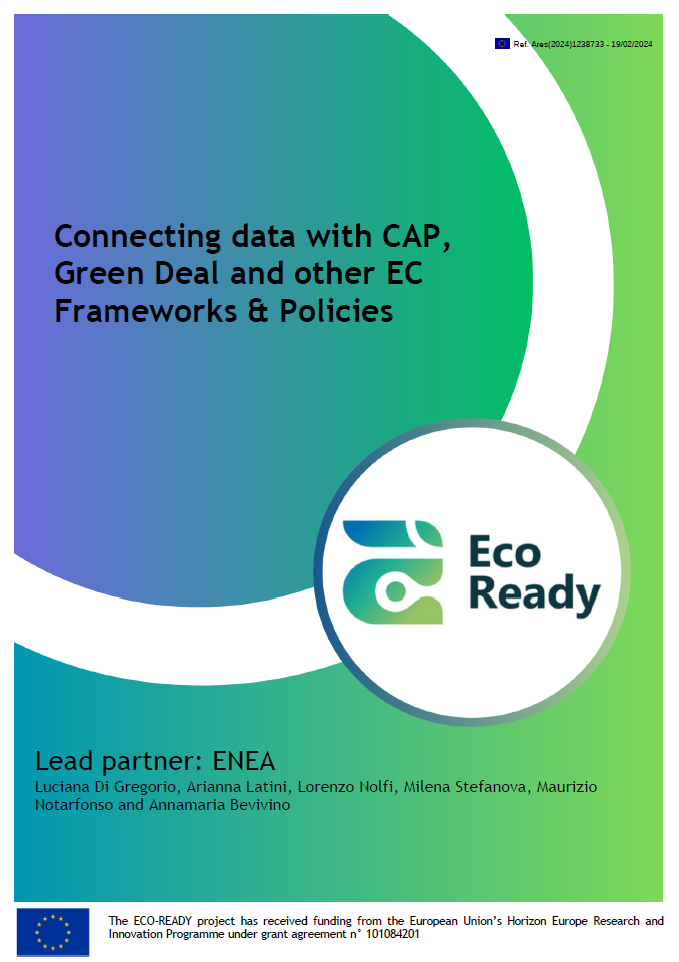
Connecting data with CAP, Green Deal and other EC Frameworks & Policies
Report by Luciana Di Gregorio, Arianna Latini, Lorenzo Nolfi, Milena Stefanova, Maurizio Notarfonso and Annamaria Bevivino
Task 1.2 main objective is to connect data with Common Agricultural Policy (CAP), Green Deal, and other EC legislative frameworks and policies, for ensuring awareness and relevance of Food Security (FS), Biodiversity (BD), and Climate change (CC) issues in the European policies. The task also aims to establish a dialogue with policy actors to incorporate their knowledge and needs into the data-policy link. The present report examines, through a systematic approach, European policy documents on climate change, biodiversity, and food security, analysing gaps and connections with data in order to provide information and tools for a sustainable transition resilient to climate change and biodiversity loss. Additionally, the current report, based on the findings through dialogue with policymakers, aims at identifying topics that are progressing towards effective sustainability and those that still remain open.
ECO-Ready Connecting data with CAP, Green Deal and other EC Frameworks & Policies
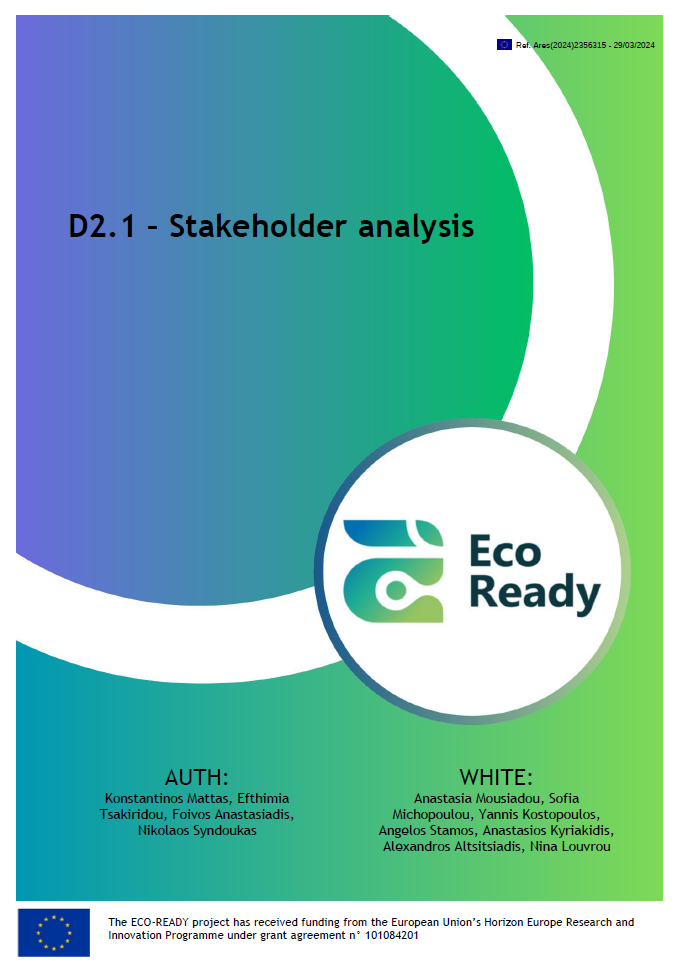
Stakeholder analysis
Report by Konstantinos Mattas, Efthimia Tsakiridou, Foivos Anastasiadis, Nikolaos Syndoukas
The ECO-READY project aims to create an integrated real-time surveillance system and digital Observatory accessible via an e-platform and mobile app. This system will serve as a central information source, providing real-time food system assessments, frequent updates, and integration with a network of Living Labs across Europe. The purpose of this report is to improve our understanding of relevant stakeholders’ perception, intentions, and level of awareness regarding climate change, biodiversity, and food security, as well as consumers' needs, interests, and behavioural change triggers toward more sustainable consumption. AUTH designed and led four focus groups implemented virtually, dedicated to an EU macro-region and covering all biogeographical regions. WHITE conducted an EU-wide survey, along with desk research, to identify factors influencing consumers' sustainable behaviour. The resulting analysis provides valuable insights that aid with WP2, WP3, and WP4 tasks, as well as contribute to the development of consumer-driven resilience strategies. Our research underscores an overall widespread positive inclination towards adopting sustainable practices among the general public. Despite this positive trend, persistent barriers include the perceived higher cost of sustainable products, limited availability, and a lack of information on product sustainability. Notably, the study reveals a general willingness among the public to pay more for sustainable products. Furthermore, indirect effects through sustainable behaviour as a mediator emphasize the significance of income, environmental awareness, and eco-labels in shaping sustainable food choices. Our analysis delves into various factors influencing citizens' behaviour towards sustainable food consumption. These encompass overall sustainable behaviour, gender, perceived sustainable food quality, health benefits, cost, and ethical considerations. Additionally, our investigation yields a set of respondent profiles delineating specific configurations indicative of sustainable food behaviour, based on participants' demographic characteristics. These profiles offer valuable insights into the diverse factors influencing sustainable food choices, allowing for a more targeted approach in promoting environmentally conscious dietary practices. The insights presented in this report aim to support the development of consumer-driven resilience strategies.
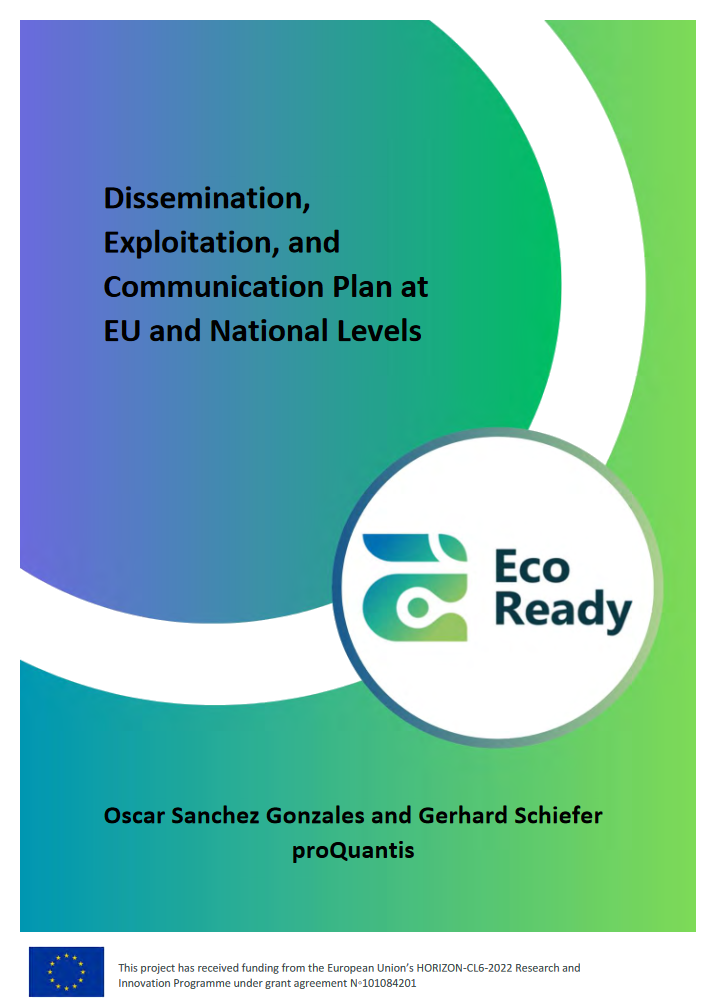
Dissemination, Exploitation, and Communication Plan at EU and National Levels
Report by Oscar Sanchez Gonzales and Gerhard Schiefer proQuantis, Bonn, Germany
The ECO-READY project is to a large extent an information and communication project. Its ultimate goal is to organize a policy hub and an observatory which together offer information and support for policy, farms, enterprises, consumers and the society on assuring food security in times of change, not the least through changes in climate developments. Dissemination of project results and communication of the project with stakeholders is preparing the way for a policy hub and an observatory to be recognized as information and service providers upon completion of the project and, in turn, reaching the impact the project aims for. Dissemination and communication activities are, therefore, a crucial element in reaching the project’s success. All partners are engaged in preparing their project results for dissemination, in using their contacts and networks for information about the project, and in creating awareness about the project and its objectives in the stakeholder events they are participating in. The project’s task for dissemination, exploitation and communication is preparing and managing the dissemination and communication channels of the project including web presence, social media and e-mail stakeholder databases. In addition, partners use their own national or international communication channels to make as many stakeholders as possible aware of the project, its objectives, and results. This document, the “Dissemination, Exploitation and Communication Plan” is meant to provide a guidance for the project and its partners about the organization of dissemination, exploitation, and communication activities (DEC activities) in the project as seen at month 6 of the project. As needs and opportunities for DEC activities will change over time in line with project developments, experiences gained in communication, feedback from stakeholders, increases in partner competences in the project’s focus, and changes in the project environment, the DEC plan is embedded in a dynamic development process. This will be captured in a regular update of the plan’s online version and the publication of an updated version at least once per year. The document has four major parts each one divided into different chapters and subchapters. Based on an outline of our conceptual approach in dealing with DEC activities (chapter 2), the document utilizes an approach developed by the EU and discusses “Pathways to impact” by linking project results to impact categories and proposals for approaching different stakeholder groups through dissemination and communication activities (chapter 3). This part builds very much on outlines in the project overview and is primarily meant to reinforce awareness of the project’s dissemination and communication needs and opportunities among project partners. Procedures on how to deal with project outcomes, some guidance on how to approach stakeholders, and an overview on the organization of the project’s dissemination and communication channels are summarized in chapters 4-6. The concluding chapter 7 discusses actual plans for dissemination and communication as known and prepared for implementation at this initial time of project implementation.
ECO-Ready Dissemination, Exploitation, and Communication Plan at EU and National Levels
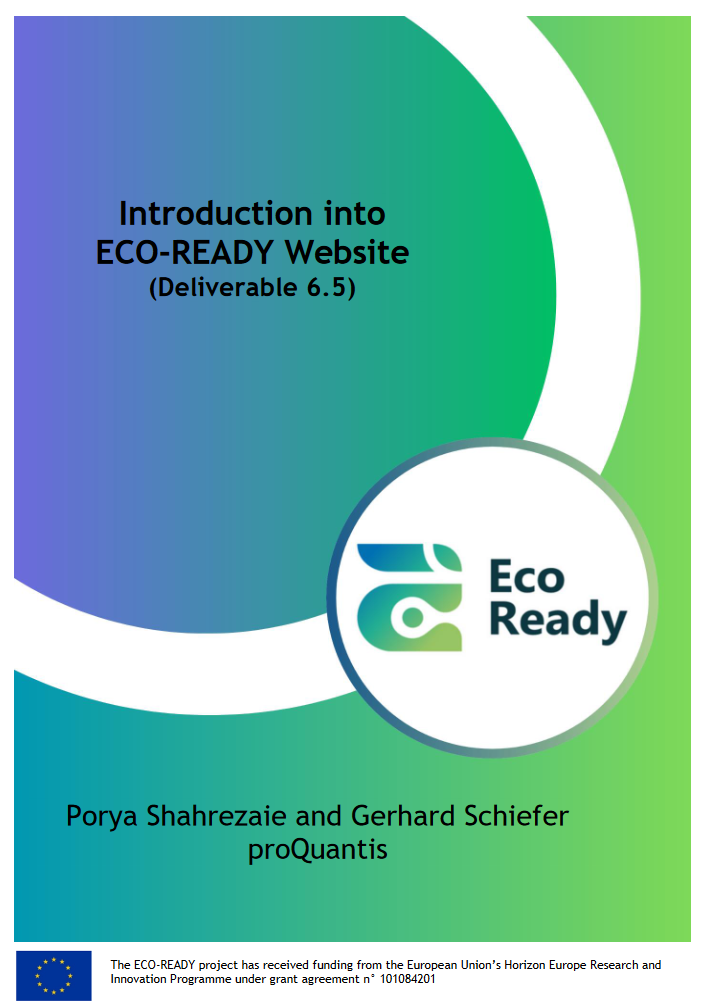
Introduction into ECO-READY Website
Report by Porya Shahrezaie and Gerhard Schiefer proQuantis, Bonn, Germany
The project ECO-Ready engages in different online channels for distributing its results and for communicating with stakeholders in its efforts to reach impact. They include a.o. a website, social media accounts, and e-mail communication. This report provides a short introduction into the website that is active by the time of the publication of this report. The website is accessible through the domain www.eco-ready.eu. It can be accessed through PCs but also through Computer Tablets and Smartphones. Its design has been developed with a use through touch screens in mind. The website is embedded in a dynamic development process and develops its content in line with the development of the project and its project activities. This means that some parts are still without content but will be filled with content at later stages of the project. The structure of the website has been prepared for providing space for the information that is available already now but also for the information the project expects to be delivered at later stages. This approach has been used for providing visitors from the very beginning of the project with a view on the project’s ambition and expected outcomes. The website has been developed by proQuantis with support from project partners. It is managed by proQuantis who is responsible for its function, the accuracy of its content (if not mentioned otherwise), the regular update of the information deliveries, and the consideration of the European data protection legislation. This report provides an overview on the website development principles and informs about the principal design elements that have been used in the development of the website. However, the design just as the content are open for change and further development throughout the project duration for continuously improving the attractiveness for stakeholders and for reaching the impact the project aims for.
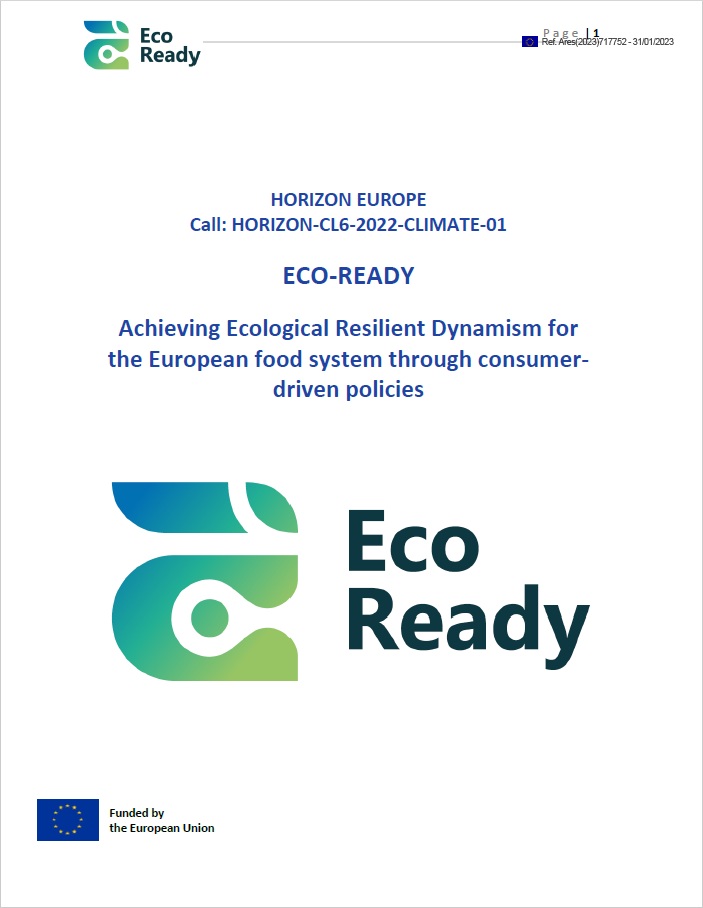
Achieving Ecological Resilient Dynamism for the European food system through consumerdriven policies
Report by Ioannis Manikas Czech University of Life Sciences – CZU Prague
The aim of this deliverable is to provide all necessary information related to the management of the project and the quality plan. These include the governance of the project with all related roles and responsibilities, the means, and processes to execute the day-to-day activities, the communication within the consortium as well as with the EC Research Executive Agency, external stakeholders, and the quality assurance plan and risk management.
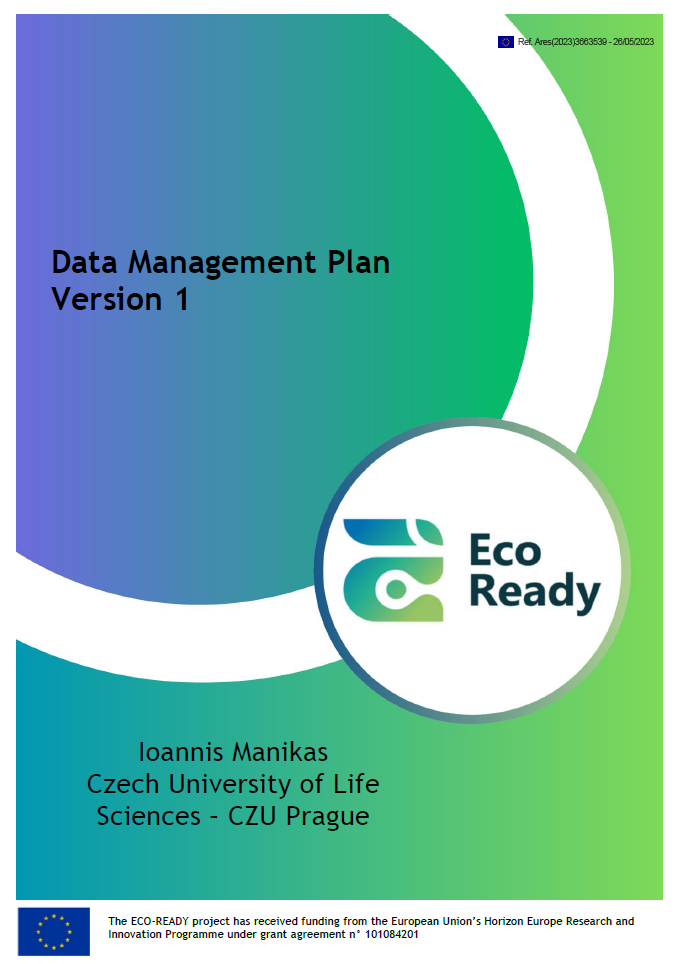
Data Management Plan Version 1
Report by Ioannis Manikas Czech University of Life Sciences – CZU Prague
This document contains the first version of the Data Management Plan (DMP) for the ECOREADY RIA HE project, addressing what and how data and metadata will be generated, collected, handled and preserved, in repositories following the FAIR principle (findable, accessible, interoperable and reuseable) as well as possible. According to the European Commission, a DMP is a key element of good data management, describing the data management life cycle for the data to be collected, processed, and/or generated by a Horizon Europe project. As part of making research data findable, accessible, interoperable, and reusable (FAIR), a DMP should include several pieces of information. First is the handling of research data during and after the end of the project, and this is particularly relevant for ECO-READY’s Knowledge Infrastructure, including the Observatory and its toolset, and the network of Living Labs. Second is what data will be collected, processed, and/or generated, third which methodology & standards will be applied, and forth whether data will be shared/made open access. Finally, it should contain information about how data will be curated and preserved during and after the project. The DMP of the ECO-READY project is developed based on the Horizon FAIR Data Management Plan (DMP) template provided by the European Commission and recommended to be used on voluntary basis.